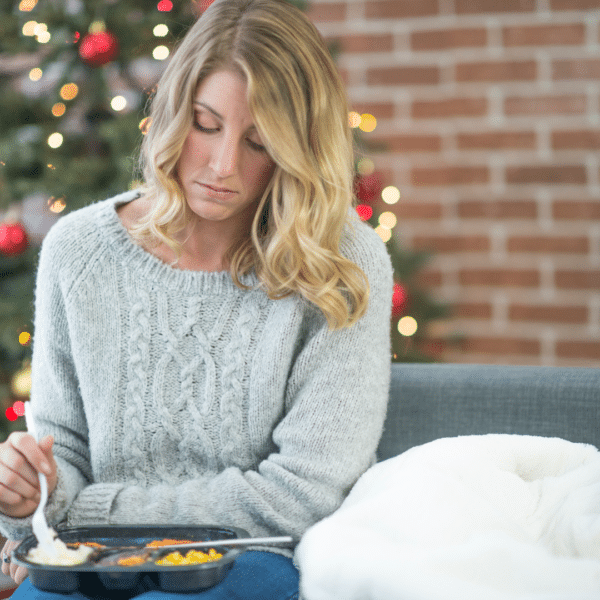

CBT for Eating Disorders.
Success tips for the Christmas period.

Lorraine Devoy
Eating Disorder Psychotherapist.
CBT is a highly effective therapy for treating Eating Disorders. For people who suffer from any type of eating disorder, the Christmas season can be incredibly challenging. Here are some success tips for the Christmas period. The pressure to consume large amounts of food can be aggravating for persons with binge eating disorder and bulimia, as well as increasing stress for people with anorexia.
At Christmas, when eating is a social affair, persons with eating disorders may feel guilty and desire to withdraw themselves from others.
At the same time, for families who are caring for someone with an eating disorder, Christmas can be a source of distress.
The occasion frequently revolves primarily around food, with constant mention of dieting and losing Christmas weight.
Maintaining recovery through stressful times is difficult, but the holiday season in particular can cause anxiety because most of us eat differently, sometimes eating more, moving less, and feeling pressured to socialize.
Many people recovering from eating disorders are already facing challenges as a result of the 2020 pandemic, so it’s normal if you’re concerned as the holidays approach.
CBT for Eating Disorders

Asking for help when eating disorder cravings become overwhelming is challenging, and it can be even more difficult over the holidays when time is spent with relatives in environments where food is the major emphasis.
It’s understandable that added pressure to eat might lead to bingeing fears, and that eating in front of people can make you feel judged.
However, things do not have to spiral out of control. As soon as you sense a niggle from your eating disorder or the panic rising in your stomach, tell someone. It’s a good idea to come up with a signal with a friend or family that indicates when you’re uncomfortable or need to be excused, which might be as simple as sending them an emoji, making a gesture, or saying anything specific.
To compensate for eating a little more over Christmas, you might be tempted to overexercise, restrict, and purge. This can entrench you in a vicious punitive cycle that can be difficult to break.
There will be more pressure to socialise, certainly a lot more focus on food and overindulgence, and you will probably have a lot less time to yourself, especially if you’re spending the festive season with family.
Being out of routine with meals can be a trigger .
Bloatedness
Having an eating disorder sometimes can lead to losing all sense of hunger pangs , your inner dialogue might be “what’s a normal amount to eat for me?” , “what’s a comfortable full feeling after a meal?”.
Sitting with bloatedness and feeling too full after a meal can be difficult . Bloating happens as a result of the body adjusting to normal eating times and adequate quantities of food .
Remember this will pass, it’s a temporary discomfort and this is where distraction , like going for a walk or doing an activity may help. Also, use positive self talk: try to calm your inner critic – substituting negative critical thoughts with more soothing reassuring thoughts.
Alcohol
There will be a strong emphasis on alcohol, which can be a dangerous cocktail mix for people affected by eating disorders, in particular people with bulimia:
Binging on alcohol can lead to purging as alcohol can be easier to purge, especially on an empty stomach.
Alcohol can be used to suspend hunger and also to suppress the distress caused by the eating disorder.
Avoid consuming large volumes of alcohol. Try to maintain hydration and make sure to have some food when having a drink.
Alcohol is a depressant as well. Be aware of the negative thinking patterns linked with a hangover, such as the “sad feeling.”
You may experience increased hunger and cravings for high-fat/sugar carbohydrates, which is a trigger for the binge-purge cycle.

Family
Ask family to avoid comments on your appearance or weight, remove trigger foods. If you are struggling, having a family member or friend to confide in and support you throughout the holiday season will help.
Although there is a strong emphasis on food and overindulgence at Christmas, keep in mind that Christmas is not just about food, try to reframe that it’s also about spending quality time with loved ones or maybe taking some quality time out for yourself if you are on your own.
Breakfast
Eating breakfast, especially on Christmas day, will set you up for success. Regular meals will help to control your blood sugar levels so that you don’t go hungry before your main meal, whenever that may be. We have a tendency to eat more than we need when we return to meals after being deprived of food for a period of time. Breakfast or small snacks throughout the day will make it easier for you to recognize hunger and fullness signs. Fasting before Thanksgiving is never a good idea, especially if you’re recovering from something.
Set Boundaries
Set some healthy boundaries. It’s perfectly acceptable to say no. Assertiveness can be difficult in the beginning of recovery because you might want to please others. It’s not your problem if your grandmother gets hurt if you for not eating an extra piece of her pie. Take care of yourself and your rehabilitation by doing what YOU need to do. Stick to your food plan, but give yourself some leeway if you want to branch out and try something new. It’s also fine to say “yes” to a second cookie if your body truly desires it.
Conversations
Some conversations may be triggering or counterproductive to your recovery. It’s perfectly fine to excuse yourself and leave. Participate in a separate conversation, play with your family’s children, pet the family dog, or go outdoors for some fresh air. This will allow you time to calm down and prevent you from being embroiled in the negative discussion.
Loss of control
The lack of control that comes with the holidays can be terrifying. Your schedule is not always as consistent as it should be. You are exposed to a variety of foods that you may not have touched in years. It’s fine if you don’t know how much butter or sugar went into the sweet potato casserole. Allow yourself to be free of Bulimia’s stranglehold, accept the unknown, and savor the food that is nourishing your body.
Fear Foods
The holidays are full of “fear foods,” such as butter, sugar, fat, carbs, and more carbs. When you’re in recovery, some of these foods can cause a lot of anxiety. It’s a good idea to find at least one person who understands this, who is safe and trustworthy, and who understands that this day may be difficult for you. Place yourself close to them. Experiment with different foods with them. Request that they hold you accountable. Throughout the day, express your concerns to them. Let them know how they can best assist you in your recovery on that particular day.
Be gentle on yourself
Even people who are not in recovery struggle with their diets during the holidays. On Thanksgiving, most people overeat. This can be especially difficult for someone who struggles with body image and an eating disorder. Be gentle on yourself. You are doing your best every day. You will do your best during the holidays. Each year, it becomes easier to manage mealtime anxiety and eat intuitively. You’ll get there eventually. But in the meantime, treat yourself with the same grace and compassion that you would show someone else.
If you are interested in learning more about Eating Disorders we have an excellent course
Diploma in Eating Disorders.
COURSE OVERVIEW
The Diploma in Eating Disorders is designed to provide you with the knowledge & skills required to effectively understand individuals who are struggling with Anorexia, Bulimia Nervosa, Binge Eating Disorder, and other eating problems.
The course is also excellent for people suffering from an Eating Disorder to gain insight into the underpinning reasons for their Eating Disorder and also to gain the tools necessary to recover.



